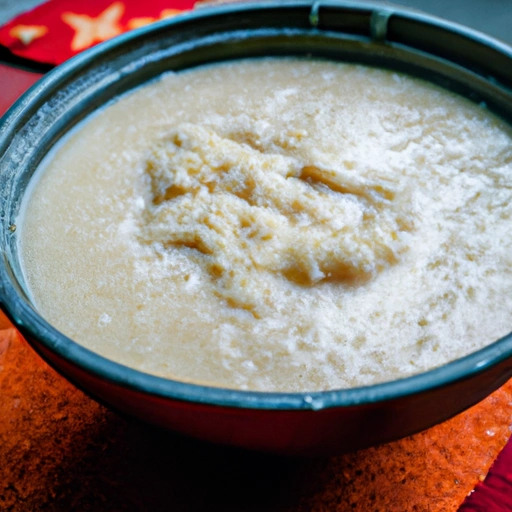Hot Eko
Hot Eko Recipe - Vegetarian Nigerian Cornflour Dish
Introduction

Hot Eko is a traditional Nigerian dish made from wet cornflour and water. It is a simple yet delicious dish that is often served hot for breakfast or as a snack.
History
Hot Eko has been a staple in Nigerian cuisine for generations. It is a popular dish that is enjoyed by people of all ages.
Ingredients
How to prepare
- Bring the water to a boil. In a pot, mix the ogi with a little warm water until it forms a smooth paste. Pour the boiling water onto the ogi mixture until it thickens and changes color.
- Stir and cook for 3 minutes. Sweeten to taste and serve hot with akara.
Variations
- Add grated coconut or chopped nuts for added texture and flavor.
- Mix in mashed bananas or plantains for a sweet twist on this traditional dish.
Cooking Tips & Tricks
Make sure to mix the wet cornflour with warm water to form a smooth paste before adding the boiling water.
- Stir constantly while cooking to prevent lumps from forming.
- Sweeten the Hot Eko to taste with sugar or honey.
Serving Suggestions
Hot Eko can be served with akara (bean fritters) for a complete and satisfying meal.
Cooking Techniques
Hot Eko is cooked by mixing wet cornflour with boiling water until thickened and cooked through.
Ingredient Substitutions
If wet cornflour is not available, you can use dry cornflour mixed with water to achieve a similar consistency.
Make Ahead Tips
Hot Eko can be made ahead of time and reheated before serving. Store in an airtight container in the refrigerator.
Presentation Ideas
Serve Hot Eko in a bowl with a sprinkle of cinnamon or nutmeg on top for a decorative touch.
Pairing Recommendations
Hot Eko pairs well with a cup of hot tea or coffee for a comforting and satisfying breakfast.
Storage and Reheating Instructions
Store any leftover Hot Eko in the refrigerator and reheat in the microwave or on the stovetop until heated through.
Nutrition Information
Calories per serving
Each serving of Hot Eko contains approximately 150 calories.
Carbohydrates
Hot Eko is a carbohydrate-rich dish, providing energy to fuel your day.
Fats
Hot Eko is low in fats, making it a healthy option for those watching their fat intake.
Proteins
Hot Eko is not a significant source of protein, so be sure to pair it with protein-rich foods for a balanced meal.
Vitamins and minerals
Hot Eko is not a significant source of vitamins and minerals, so be sure to include a variety of fruits and vegetables in your diet.
Alergens
Hot Eko is gluten-free and dairy-free, making it suitable for those with food allergies or sensitivities.
Summary
Hot Eko is a low-fat, gluten-free dish that is rich in carbohydrates and low in calories.
Summary
Hot Eko is a simple and delicious Nigerian dish made from wet cornflour and water. It is a versatile dish that can be enjoyed for breakfast or as a snack, and can be customized with various toppings and flavors.
How did I get this recipe?
I can't forget the moment I stumbled upon this recipe for Hot Eko. It was a warm summer day, and I was visiting my friend Maria's house for a cup of tea. As we sat in her cozy kitchen chatting away, she suddenly disappeared into her pantry and reemerged with a tattered old cookbook in her hands.
"This recipe has been in my family for generations," Maria said with a twinkle in her eye. "It's a traditional dish from my grandmother's village in Nigeria. Would you like to try it?"
I couldn't resist the opportunity to learn a new recipe, especially one with such deep roots. Maria began to gather the ingredients, explaining each step with care and precision. The process was intricate and required patience, but the end result was well worth it.
Hot Eko, as Maria called it, was a hearty and flavorful dish made with cornmeal, spices, and a variety of vegetables. It was a staple in her family's kitchen, especially during the cooler months when a warm and comforting meal was needed.
As we sat down to enjoy our steaming bowls of Hot Eko, I was struck by the depth of flavor and the sense of tradition that permeated each bite. Maria's eyes sparkled with pride as she watched me savor the dish, knowing that she was passing on a piece of her heritage to me.
From that moment on, Hot Eko became a regular fixture in my own kitchen. I tinkered with the recipe, adding my own touches and tweaks to make it my own. I shared it with friends and family, each time recounting the story of how I learned to make it from Maria.
Over the years, Hot Eko became a beloved dish in my household, a symbol of the connections forged through food and the power of sharing recipes and stories with one another. It was a dish that brought people together, sparking conversations and memories that would last a lifetime.
As I look back on that fateful day in Maria's kitchen, I am filled with gratitude for the gift of her recipe and the friendship that blossomed from our shared love of cooking. Hot Eko will always hold a special place in my heart, a reminder of the beauty and richness that can be found in a simple bowl of food. And I will continue to pass it on to future generations, keeping the tradition alive and the stories alive.
Categories
| Cornmeal Recipes | Nigerian Recipes | Nigerian Vegetarian |